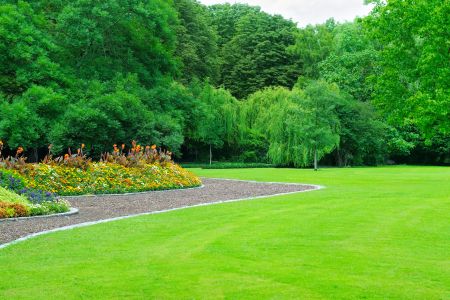4 Myths About Lawn Care

If you're one of the many Vernon homeowners out there who want that thick, lush lawn but just can't ever seem to get your lawn to that point, it might be time to take a long, hard look at your lawn care habits. There are a lot of common lawn care myths out there that can wind up doing more harm than good when it comes to your lawn, and today, our team of skilled landscaping pros here at Mikulik Lawn and Landscaping have taken the time to put together this short list with the aim of dispelling several of these myths. If you'd like to learn more about how you can attain the kind of lawn you've always wanted, we urge you to read on and give us a call if you're looking for some professional lawn care help.
Grass Is Just Grass
When you look at grass, you might think it is all the same—just grass—but this simply isn't true. There are a number of different varieties of grass that have unique requirements, meaning that what causes one type of grass to grow might cause another to struggle. Some grasses have a strong resistance to diseases and pests but need more water, while other grasses need special care for pests but very little water. Climate and the type of soil can directly affect how well certain grasses grow and why others won't seem to grow.
Fertilizer Isn't Necessary
If you want a dense stand of grass, one that's thick enough to choke out weeds, then fertilizing is a must several times per year. Since grass types are distinct and fertilizer is made up of three primary nutrients, you need the right fertilizer in the correct ratio to boost the growth and thickness of your grass. Fertilizer is composed of nitrogen, phosphorus, and potassium—known as the Big 3—all of which are needed for grass to thrive. Nitrogen can be the most important nutrient as plants and grass absorb more of this nutrient than they do of others. It helps with protein production and overall plant health. Phosphorus assists a plant with photosynthesis in the way it produces and stores energy for growth. Potassium is necessary for disease and pest resistance. In combination, these nutrients boost the health of your grass, allowing it to grow strong, lush, and green.
Cut The Grass Short
You might be tempted to cut the grass short to eliminate the need to mow again for another week, but this is a habit that can cause your grass to suffer and die. When the hot summer sun can bake the dirt underneath your grass, your grass can turn brown and wither. Keeping the grass on the long side can protect the tender roots and leaving the shorter grass clippings on the grass after mowing can also add more nutrients and protection to your landscape.
You Can Water At Any Time
Unfortunately, watering your grass in the evening can set your lawn up for mold and fungus as the moisture sits on the blades for too long. The ideal time to water grass is in the very early morning because it has time to penetrate the soil deeply to reach the roots while the sun can burn off the excess water from the blades once it warms up. Watering in the middle of the day can lead to the water evaporating too quickly to make any difference, in essence, wasting the water you intended to feed your grass.
